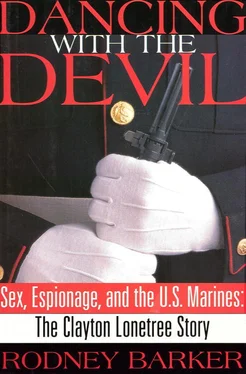Judge Roberts was aware that unlawful command influence was probably the biggest single threat to the fairness of the military justice system. Indeed, every military court was subject to the same suggestion: Since everybody involved is on the same payroll, how can you ever get a totally impartial jury? But he would deny this motion, and his reasoning was that unless the entire court-martial proceeding was abolished, he didn’t think you could ever get rid of the specter that a panel of officers may be influenced by the pressure of command influence. But in this case no one was overtly saying to them, Vote this way. There was enough uncertainty and variety in the press to cast doubts on the accuracy of some of the statements that had been made. And the individuals saying these things were so far removed from the people who would be making the decisions, he didn’t think it would influence them to the extent that they could not hear the case fairly or impartially. He also knew that defense counsel would get the chance through voir dire to question the members about whether or not they felt they could do their job honestly. Although he could only speculate on what operated at the subconscious level, he certainly did not see this motion as grounds for dismissal.
The crucial motion for the defense concerned the damning statements Lonetree had made in his confession. If the confession was allowed, chances were good he was going down; if the confession was thrown out, he was home free; and they thought there were legitimate grounds for suppression. Under Article 31 of the Uniform Code of Military Justice, which was the military’s version of a Miranda warning, as soon as someone with military status was believed to have committed an offense, prior to any interrogation by a person of authority and before any attempt to elicit incriminating responses, he had to be informed of his rights. But this was not what the CIA had done when Lonetree had come forward in Vienna. Little John had told Lonetree that his disclosures were “confidential” and it would not harm him to be forthcoming and truthful. Lonetree was even led to believe that the CIA would consider using him as a counterintelligence agent if he continued to cooperate. And meanwhile the CIA was sharing the substance and details of Lonetree’s disclosures with other agencies, including the Naval Investigative Service, knowing that they would stack up for future use in a criminal investigation and eventual prosecution.
The second part of the motion to suppress challenged the impartiality and credibility of the investigation conducted by the Naval Investigative Service. The defense attacked Lonetree’s statement to NIS agents on the grounds that it was not a verbatim transcript but had been constructed and selectively edited so as to get Lonetree to admit to offenses he did not commit, as proved by agent Tom Brannon’s instruction to “Tell me a lie.” And as further proof of NIS’s malice, the defense wanted to introduce into evidence the allegations made by other Marines that NIS agents had tried to intimidate them into supplying false statements that would implicate Lonetree in an espionage conspiracy, with Arnold Bracy as the star witness.
Of course, the prosecution disagreed. While acknowledging that the CIA may have behaved in a manner that could be thought of by some as unethical, Major Beck pointed out that the CIA was not legally obligated to inform Lonetree of his rights, because it was a counterintelligence agency, not a police force. Furthermore, testimony taken from the CIA agents who had dealt with Lonetree showed that while they encouraged him to keep talking, they did not deceive him with false promises. Indeed, the NIS had gone to some lengths to make sure he was given the opportunity to sign the appropriate warnings and waivers when he came into its custody as a precaution against these very accusations.
Concerning the malicious attacks on the NIS, Major Beck declared, “Mr. Kunstler has made a lot of broad statements and a lot of broad accusations in this case, most of which are not only inaccurate, they’re wrong.”
Before he would make a ruling, Judge Roberts felt the importance of this motion and wide differences of opinion necessitated testimony. Both Big John and Little John of the CIA, as well as the NIS agents who had picked up Lonetree in Vienna and interrogated him in London, were brought in, and the scenes they described made a sound case for voluntariness on the part of Sergeant Lonetree. Little John even testified, “The only trouble I had was writing fast enough to keep up with him.”
For the defense, none of this testimony mattered. They knew that cold cross-examination of CIA and NIS agents was only going to produce a recitation of their previously stated positions. William Kunstler was so disdainful toward the NIS agents who testified that as they answered questions he doodled on a scratch pad. At a press conference afterward, he distributed a poem he said was inspired by their testimony.
The NIS’s a very hardy bunch
Whose members go to any length to show
The government’s first instinctive hunch
Is nothing less than absolutely so.
“Please tell us anything you want to say,”
They urge, “no matter that it is a lie.”
They like to question suspects night and day
In hotel rooms until their victims cry.
They piously proclaim their every move
Is to protect the rights of everyone,
While, in their hearts, they’re only out to prove
That what the prosecution claims was done.
It seems to be an awful crying shame
That this is how these minions play the game.
Judge Roberts would reject the defense team’s argument that the confessions were improperly obtained, saying that even though at a later time Lonetree had apparently decided it had not been to his benefit to confess, from everything that had been testified to, it was apparent that Lonetree’s statements were “completely voluntary” and legally obtained. The CIA had no formal obligation to inform Lonetree of his rights, and the NIS agents appeared to have obtained a statement in textbook fashion. Whether or not Lonetree should have been told to lie was debatable—the NIS defended the tactic as a technique the polygrapher used to encourage Lonetree to resume talking, not to solicit a false confession—but what was important from a legal standpoint was that as soon as the NIS determined that this part of Lonetree’s confession was untrue, the charges based on what he’d said in response to the request to lie had been dropped. Furthermore, and perhaps most significant to Judge Roberts, there was no rebuttal from the accused. Lonetree admitted he had initiated these matters. He did not get up and say, Here is what they did to me and here is what was wrong with the questioning procedure.
Dealt a critical blow when Roberts ruled against the motion to suppress, civilian counsel were left with very little other than hoping that the prosecution would not be able to prove the elements of offense beyond a reasonable doubt. It was one aspect of the military justice system that could work for them: A confession had to be corroborated almost line for line.
No one knew this better than Major Beck, and all along it had concerned him, because he was not absolutely confident that the evidence collected by the NIS was sufficient corroboration. What if Lonetree suddenly claimed he made this all up? What if the defense decided to say the confession was a figment of Lonetree’s imagination?
Beck felt he needed to have a witness, and the closest person to filling that bill was the CIA man in Vienna who had shown up at St. Laurentius Church in Vienna on December 27 and identified Lonetree’s handler: Yuri Lysov, a.k.a. George.
Battling the Agency over this issue had just about driven Beck to resign as prosecutor. Criminal prosecutions were anathema to the CIA, because they threatened to reveal classified information or disclose covert identities. In this case, the Agency seemed to feel that what it had to learn had been fully disclosed to it, and it didn’t have anything to gain by cooperating with the prosecution. When Major Beck first raised the matter of providing a witness, the Agency’s response was typical of a bureaucracy that knew delay would serve it well: There was no response. Tired of watching sand fall through the hourglass, Beck asked again and received a curt no. He decided to appeal and went up the chain of command for help. This resulted in a series of negotiations with CIA attorneys, with whom he became so frustrated that at one point he said, “Look, the espionage laws that Lonetree is being prosecuted for were designed to protect not national security generically, but specifically intelligence officers operating overseas. If you people don’t want your officers and their sources protected, then the heck with it. We’ll just fold up our tent and go home.”
Читать дальше












